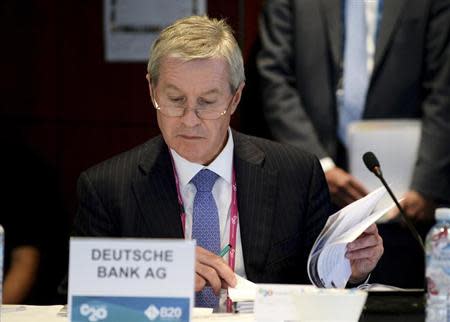Deutsche Bank co-CEO warns of fallout from new Fed rule

FRANKFURT (Reuters) - Deutsche Bank co-Chief Executive Juergen Fitschen warned that financial regulators' efforts to strengthen banks had overshot the mark and that a lack of coordination among them had led to an unfair playing field for Europe. His comments follow action by the U.S. Federal Reserve last week to adopt tight new rules for foreign banks with sizeable operations on Wall Street such as Deutsche and Barclays , which will need to shift capital from Europe as a result. "Those who designed the rules have overshot the goal. They're not improving the system by doing that, rather they ensure that banks coming from Europe are disadvantaged in global competition, and that is a position that I do not consider to be good." The Fed broke with its tradition of relying on regulators abroad in overseeing foreign banks after the financial crisis, when it extended hundreds of billions of dollars in emergency loans to overseas banks. The reform aims to prevent U.S. taxpayers having to foot the bill if European and Asian regulators treat U.S. subsidiaries with low priority when rescuing one of their banks. The largest foreign banks, with $50 billion or more in U.S. assets, will need to set up an intermediate holding company subject to the same capital, risk management and liquidity standards as U.S. banks. "My fear is that what we have seen come to pass in America is only the starting point for a development that cannot be stopped," Fitschen said at a banking conference. "That is not the end of global banking but it is another world in which we don't fully comprehend. Somebody is going to have to pay the price for it in the end," he said. Fitschen said U.S. authorities should rather have trusted foreign regulators to do the job, as was largely the case up until the Fed's decision last week. The current state of play put European banks at a competitive disadvantage, he said. "The old regime worked quite well, in my opinion." In response to the new Fed rule, Deutsche Bank will shrink its U.S. balance sheet by moving some capital intensive operations elsewhere, but it does not plan to reduce its activities focusing on North America. (Reporting by Jonathan Gould and Andreas Kroener, Writing by Thomas Atkins. Editing by Jane Merriman)

 Yahoo Finance
Yahoo Finance 